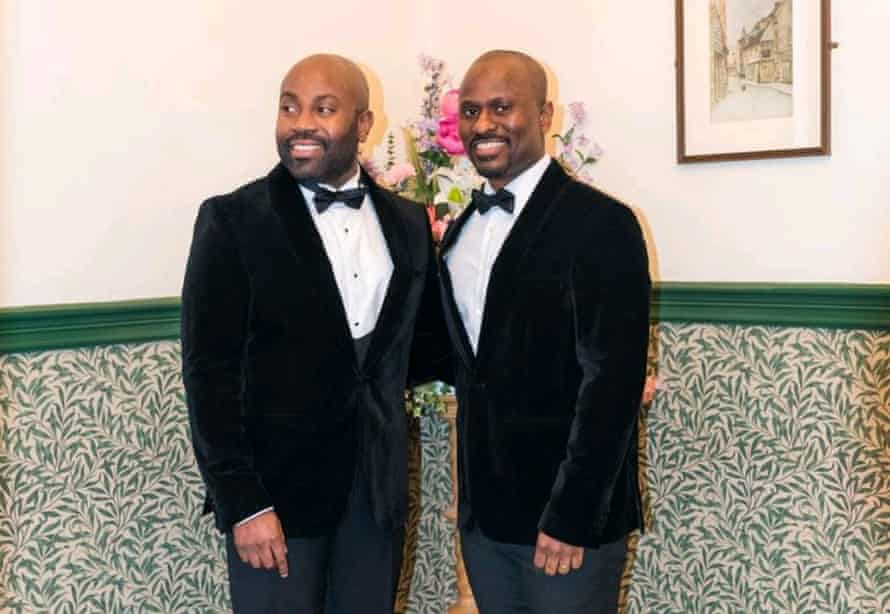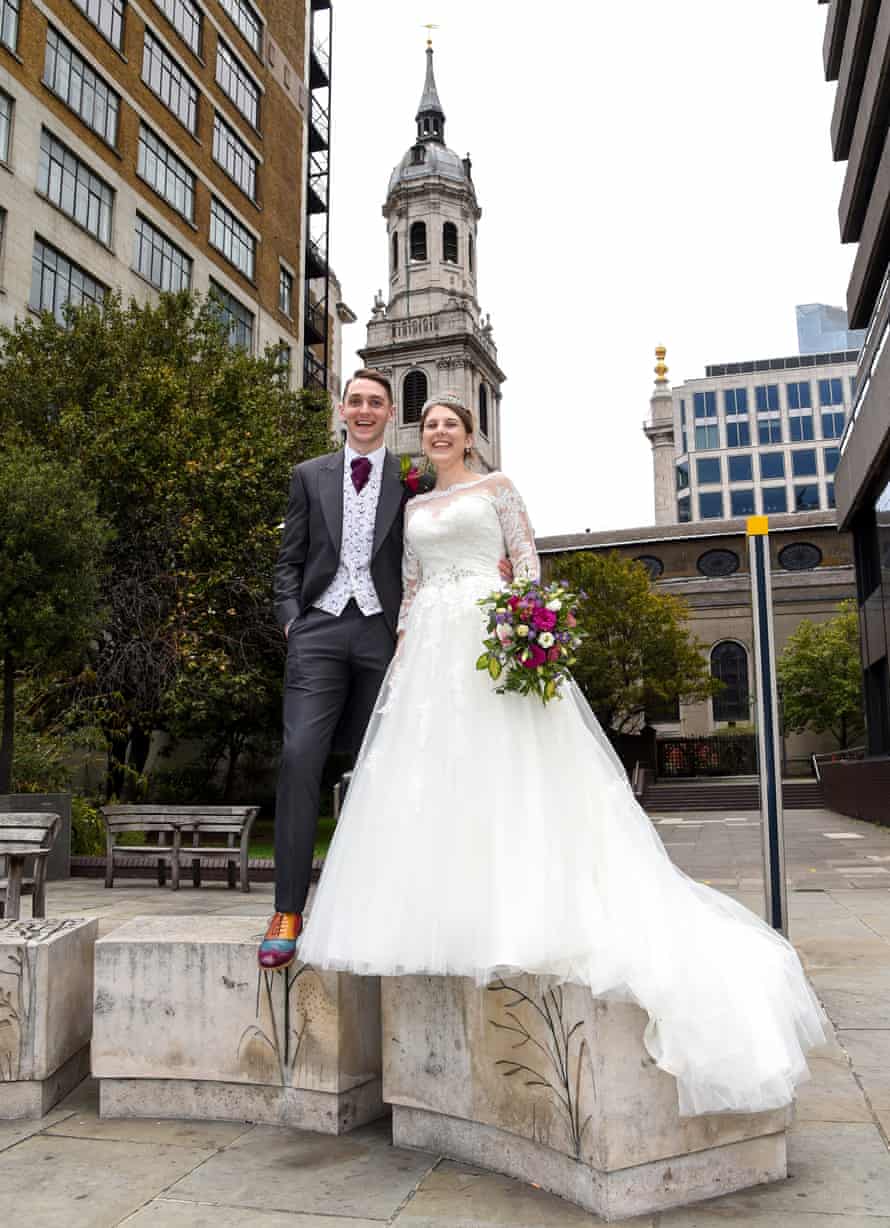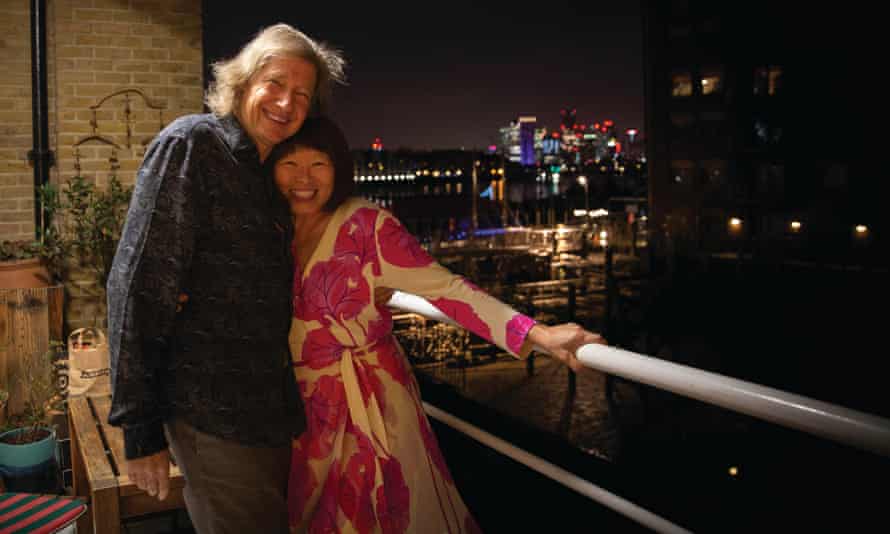Christine Kim, 30, and Matthew Johnson, 29
When it became clear that their planned December wedding in a church in Cambridge was going to be at best Covid-complicated, they shifted into “How do we make this into a virtual wedding?” says Christine, who works for a tech nonprofit in the city. “We didn’t want people travelling; we couldn’t risk a super-spreader wedding. My parents are in South Korea, while Matthew’s parents work in global health in San Francisco, so there was no family drama. They all totally agreed with us.”
“The advantage of doing it virtually was that we could expand who was involved,” she continues. “For the ceremony on Zoom we had more than 200 logins, with probably 350-400 people. We had friends doing readings who live too far away to have attended at all had it been in person. My childhood friend with whom I’d lost touch for 10 years sang for us. That was a real gift.”
The reception was entirely virtual. The time was set to allow those at the church to get home and eat, and for the opposing time zones of Asia and America to both be just about awake. Around 100 people came together on the online platform Gather, where Matthew, an Oxford research fellow specialising in ethics and the philosophy of joy, had created a customised virtual venue.
Guests could “walk” around and wander in and out of 14 break-out rooms. “Each was for a different part of our lives,” says Matthew, “family, friendship groups, activities like my old university rock band and sports team, so people could get together and chat and reminisce.” Matthew made a tutorial video for their guests and, he says, “All our relatives and friends – some more than 100 years old – managed to navigate just fine and appreciated the interaction.”
Kayus, 40, and Phil, 38, Barton-Fernander

“For two Afro-Caribbean men to marry each other, and their families and friends not only to accept it but to be lovingly involved and very supportive, is huge at any time,” says Phil, a primary school teacher originally from Barbados. “It really is,” agrees Kayus, who was brought up in the Bahamas and now works in finance. “Add doing it in the middle of a pandemic and it was really emotional.”
They had planned a destination wedding in southern Spain. “We’d chosen a year-specific tagline: ‘2020 – our vision is clear’,” Kayus says, with a dry smile. But in the middle of March, Spain locked down. “We didn’t want our guests to have to choose between a risky trip and fearing offending us,” says Phil, so they postponed by a year.
By autumn, they began to think again. It had always been their intention to do the legal formalities in the UK just before leaving for Spain; now they decided to get on with it.
“All through the November lockdown we thought it would never happen,” says Kayus. “So when it was lifted in time for the wedding, I thought, ‘Why not make a bit more of this?’” They quickly invited six guests and ordered flowers, a wedding cake and personalised masks.
As the day neared, Kayus went to collect the flowers, including two identical buttonholes, explaining that they were for his same-sex wedding. He was more than a little taken aback when the florist asked, “And which are you, the bride or the groom?” – “I just didn’t know how to respond!”
The next day wasn’t much better. “We already had our suits for the Spain celebration, but I couldn’t fit into mine after lockdown!” says Phil. “So we decided to get new ones.” The shop assistant was helpful and complimentary “until he asked if I was Kay’s best man,” says Phil. “Kay said, ‘No, we are both getting married to each other’ – and the man just bolted. He took a long time to compose himself and come back. It seems even now not everyone can cope with a gay wedding.”
At the register office, says Phil, we had to follow pandemic advice very closely. “It was constant: ‘Not too close… don’t move… stay on the marks. It was like musical chairs. It was hilarious.”
“It felt like such a big thing,” Kayus explains. “We’re Afro-Caribbeans and no African country except South Africa would let us do this, and neither would the Caribbean islands we come from. So being handed that certificate of marriage was really something very special.”
Margaret, 30, and Jamie, 32, Rogers

Margaret is a doctor, usually an orthopaedic registrar dealing with broken bones, but at the moment she is often helping out in the ICU. Jamie is a mental health nurse in the child and adolescent service, where things are also very hectic. The intensity of their work has had its advantages, says Margaret: “We didn’t have the headspace to dwell on the wedding, as pretty much everything changed but the date.”
Arrangements were “finalised” in February for an October wedding in their local church in Birmingham, with a reception for 120 people.
They held their nerve through the first lockdown, and when hospitality reopened in July, they thought they were on track. Then their venue called to say it would not be reopening its kitchens before November… and the government announced a guest-list limit of 30.
“I had a little cry to a colleague at work, who said she wished she could hug me,” says Margaret, “then I got on with it.”
“When we first talked about cutting the guest list we thought we could not get below 60,” says Jamie, who comes from a large Irish Catholic family, “but when it was 30 or don’t get married we got ruthless. My dad was really helpful. We were agonising about all my uncles and aunts, but he just went ahead and told them all they couldn’t come, before we’d even said a thing.”
Margaret had always wanted to get married in St Magnus the Martyr church in London Bridge, where she had been part of a supportive congregation when she worked in London, and which had welcomed Jamie as he became part of her life.
With the couple now based in Birmingham, they had thought it would be too much to organise a large reception in central London, but now they were down to 30 people.
St Magnus was able to accommodate their original date and they were once again good to go. “By this time infection rates in the northeast were rising,” says Margaret. “It was creeping towards us and I could hardly watch the news.”
“The day the rules changed again, I got a promotion,” says Jamie. “I was really pleased, but my ushers kept messaging me with rumours that all weddings were cancelled. I was like: ‘Dudes, let me enjoy this – and no rumours. Definitive information only please!’”
By the time they heard guest lists had been reduced to 15 rather than banned altogether, it was almost a relief. Cutting back again wasn’t too hard, recalls Margaret. “Several relatives had said they didn’t feel safe coming and the few we had to disinvite were very gracious.”
Masking up was no problem for this couple – they wear them all the time at work – but “The bride and groom are exempt from wearing masks for the ceremony,” says Margaret, “and it felt very weird not wearing one when everyone else was.” One positive difference was that “unlike at a big wedding, we got to talk properly to all our guests.” They even managed a couple of days’ honeymoon in the Lake District before the next lockdown.
Guy Hibbert, 70, and Meifu Wang Hibbert, 62

Two days before Guy and Meifu were due to get married last year, London was placed into tier four. “Boris Johnson didn’t say anything about weddings,” says Guy, “but by about 7.30pm, it was online: weddings postponed from midnight.”
For Guy and Meifu this wasn’t just inconvenient – it meant they were facing indefinite separation.
Meifu lives in Seattle. She came to London to join Guy in July 2020 on a six-month visa due to expire in January. Guy is British and not currently allowed into the US because of the pandemic.
At 8.30pm the couple was drinking wine and eating a noodle supper, and wondering what next, when Guy’s phone rang. “He doesn’t usually answer unknown numbers,” says Meifu. “Thankfully, this time he did.” “It was Southwark Council,” says Guy, “saying if we could get to the register office by midnight they’d marry us.”
They called their witnesses. Meifu’s sister was unreachable but Guy’s daughter, Celeste, grabbed her camera and her partner, and headed over.
At the register office the little wedding party joined the queue outside. Waiting with other couples who had dashed over to beat the deadline was lovely, Meifu says. “There was a really festive atmosphere.”
“I think even the register office staff enjoyed it,” adds Guy. “It was so brilliant of them to take the initiative to do this for us and we were so grateful.”
As a screenwriter (with credits including Eye in the Sky, starring Helen Mirren) Guy had, like so many, suffered a difficult year of projects postponed and abandoned, but in January 2020 he had met Meifu in Los Angeles. “I was there very briefly for work,” he says. “It was quite a four days: I met Werner Herzog and my future wife.”
Meifu used to work as a government adviser on transportation in Washington DC, but now has a more flexible role writing and translating modern Chinese poetry. Guy went to stay with her in February 2020, returning “just as everything kicked off,” and they were locked down 5,000 miles apart. It’s only thanks to the Southwark Council staff that it didn’t happen again.
This content first appear on the guardian
